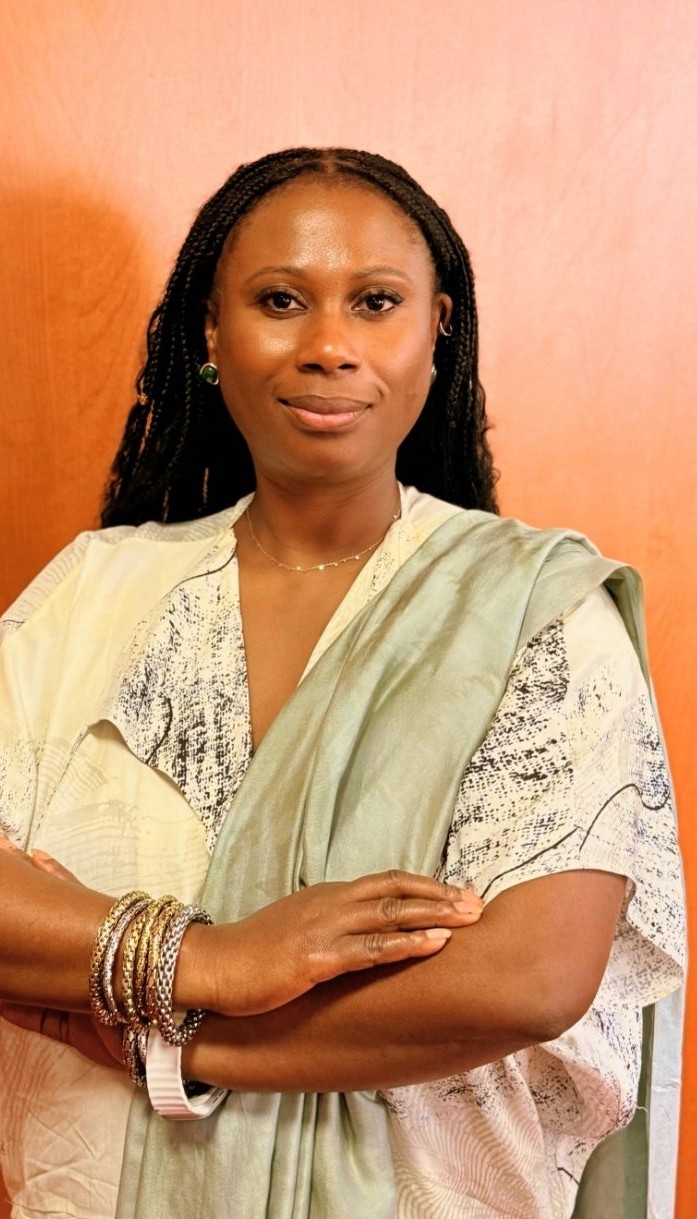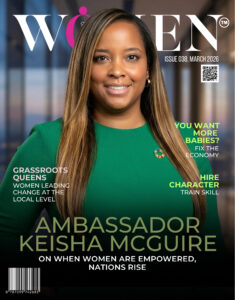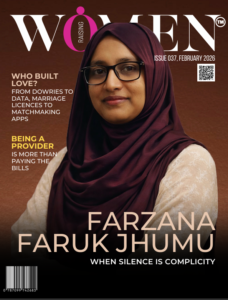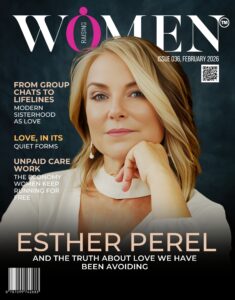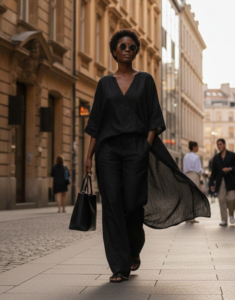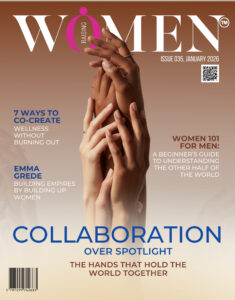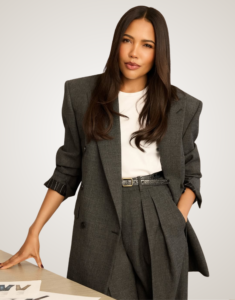By Daniel Agusi
Life on the move is never simple, yet for Adwoa Kufuor-Owusu, it has become second nature. As a United Nations professional, her work has taken her across borders and into new cultures, where she is constantly learning, adapting, and finding fresh ways to build a sense of home. For her, settling in a new place isn’t just about unpacking boxes, it’s about finding community, connection, and purpose.
In this conversation with RWMagazine, Adwoa shares the joys and challenges of living between worlds, the little rituals that keep her grounded, and how her journey has shaped her perspective on identity, belonging, and well-being. She also reflects on our annual theme, The Woman: Her Worth, Her Wealth, and Her Well-Being, leaving us with wisdom every woman on a journey, whether across countries or within herself, can relate to.
Q:
You’ve worked with the UN in different countries before coming to Nigeria. How do you adjust each time you have to move to a new country and culture?
Adwoa Kufuor-Owusu:
I think the nature of the work is that you join knowing you’re not going to be in one country. Movement is really part of it, and it offers you the opportunity and the privilege, really, to experience different cultures and different people.
For me personally, I often feel I’m not settled unless I have a community. My community usually involves actually finding a church. Interestingly enough, any place I move to, if I can find a place of worship, that’s when I feel like I’m really settled.
It’s also about going with an open mind. Usually, I’ll do a lot of research before moving, to understand the culture, to understand the people. And you’re quite surprised, the differences between us are not that much. The work is also very similar, it’s all really about helping people. Since we have more in common than differences, it’s easy to adapt.
But it’s really about finding a community. That can involve, as I already said, finding a place of worship, finding a school for my child, but also finding other activities, hobbies that are universal. This includes walking, I love walking and in every place I’ve moved to, there have been walking clubs. That’s also a way of adjusting.
So it’s about preparation: know where you’re moving to, understand the people, understand the culture, be respectful, and do a lot of reading.
The trick is research and preparation. And then, finding what gives you a sense of community. For me, that’s a church. Once I find that, I always feel like I’ve really settled and I belong.
Q:
What has been the most rewarding aspect of living and working outside of your home country?
Adwoa Kufuor-Owusu:
It’s been a privilege, I must say. It allows you to understand the world is much bigger than you would have seen otherwise.
For me, having the opportunity to experience different cultures, different food, and different people and all the colors the world offers has been amazing. I move with my family, and it’s allowed us to learn multiple languages. We have friends all over the globe, and it’s broken down a lot of barriers.
If I had stayed in one place, yes, that would have its benefits, continuity and stability. But the world is so interconnected. Traveling shows you how diverse, beautiful, and fulfilling life is. It gives you a bigger picture of what it means to be human.
What’s your favorite country so far?
Adwoa Kufuor-Owusu:
I can’t really pinpoint one. Every place I’ve moved to has something special to add. I want to go back to most of the places I’ve been. I don’t think I’ve yet found my favorite place, that’s probably why I won’t stay in one place too long.
What I can say is that I love places that are hot, have beaches, rainforests, strong nature, and community that is welcoming. So it’s not one place, but the elements that make a place that matter.
Q:
Every relocation comes with challenges. Can you share a moment when adapting to a new environment tested you, and how you overcame it?
Adwoa Kufuor-Owusu:
Even though I love traveling, I’m also afraid of change, which sounds paradoxical. When I have to move, I become very nervous and anxious. I always wonder, “Will I find a community where I’m going?”
What’s helped me is a small book called Who Moved My Cheese. It’s a self-improvement book you can read in one sitting. I carry it with me, and every time I have to move, I read it. It reminds me and really helps me prepare.
There’s always the fear: will I find like-minded people, will I be accepted? For example, when I moved to Afghanistan, I thought, “Oh my goodness, they’re not familiar with people from Africa, with Black people like myself.
How will I fit in? How will I be perceived?” Plus, you have the security situation, and you’re far away from home, from what you know. But it’s never been as bad as I feared.
It’s always about looking at it as an adventure, not something to fear. You’re going to learn new things, meet new people, experience life in ways you otherwise couldn’t. That’s the mindset that has carried me.
Q:
Out of curiosity, how many languages do you speak?
Adwoa Kufuor-Owusu:
If we’re talking about languages where I can do supermarket shopping, go to the market and banter, then around four. But in terms of writing reports, debating politics, and going in-depth, that would be three. And in others, I can engage casually with market women and children on the street.
Q:
How has your work with the UN shaped your personal view of “home” as someone who constantly moves across borders?
Adwoa Kufuor-Owusu:
Home is where you make it, and home is where your heart is. I’m African, so I’ll always have that calling to come back to where I come from. I know my history, my language, my food. I carry that legacy everywhere I go.
But my work has also taught me that other rich cultures co-exist, and they are not less than or better than mine. We can learn from each other. Home is not just Ghana, home can also be Nigeria, Eswatini, or wherever I am.
It’s important to give yourself and your children a strong sense of identity while also teaching them that the world is a much bigger place, and it belongs to everyone.
Q:
For women aspiring to careers that involve international travel and mission work, what advice would you give on balancing personal well-being with professional purpose?
Adwoa Kufuor-Owusu:
Know why you’re doing what you’re doing. I joined the UN young, and I knew I wanted to travel the world, help others, and work in this field.
You need a clear plan. Some may want a family and stability. Some may want to travel short-term and return. Others may want a permanent global career. It’s a personal decision.
I chose to do “non-family duty stations” while I was younger, where you go alone and can’t be with your husband or children. That allowed me later to take posts where my family could join me.
It’s not a deterrent for young women. Just know what you’re getting into, and be ready for the adventure. Also, be aware of the trauma that comes with conflict zones. You have to prioritize your health. Nobody else can be responsible for you but yourself. Stay focused and come back to your center when you get distracted.
Q:
Having lived in different countries, can you mention at least three of your favorite meals?
Adwoa Kufuor-Owusu:
Over the weekend I cooked rice with almonds, raisins, and liver with curry. That brought back a lot of memories, I used to love that.
I also love okra, which is prepared differently in different countries. Sometimes it’s dry and fried with garlic and tomato. Sometimes it’s runny and eaten with rice.
And of course, Jollof rice. As a Ghanaian living in Nigeria, I must say both have their strengths. They each have their own unique flavor.
Q:
Our theme for the year is The Woman: Her Worth, Her Wealth, and Her Well-Being. As a closing reflection, what message would you offer to women everywhere on this theme?
Adwoa Kufuor-Owusu:
Wealth: As women, we face the same challenges as men. We need to be financially literate, manage our accounts, budget, invest, and plan for our futures. Financial independence is key.
Worth: We are more than 50% of the world. We don’t need external validation. From birth, we are special. I’ve been lifted by networks of women older, younger, and peers and I mentor young women in return. Once you find your worth, pay it forward.
Well-Being: This changes with phases of life. At different ages, we face different challenges. For me now in my 40s, it’s about understanding my body, health, and changes. Well-being isn’t just spa visits or holidays. It’s also physical, mental, and cultural health.
I think African women need to speak more openly about perimenopause, menopause, and health in our own context, not just rely on Western narratives. True well-being comes from confidence, knowledge, and self-care rooted in our realities.

